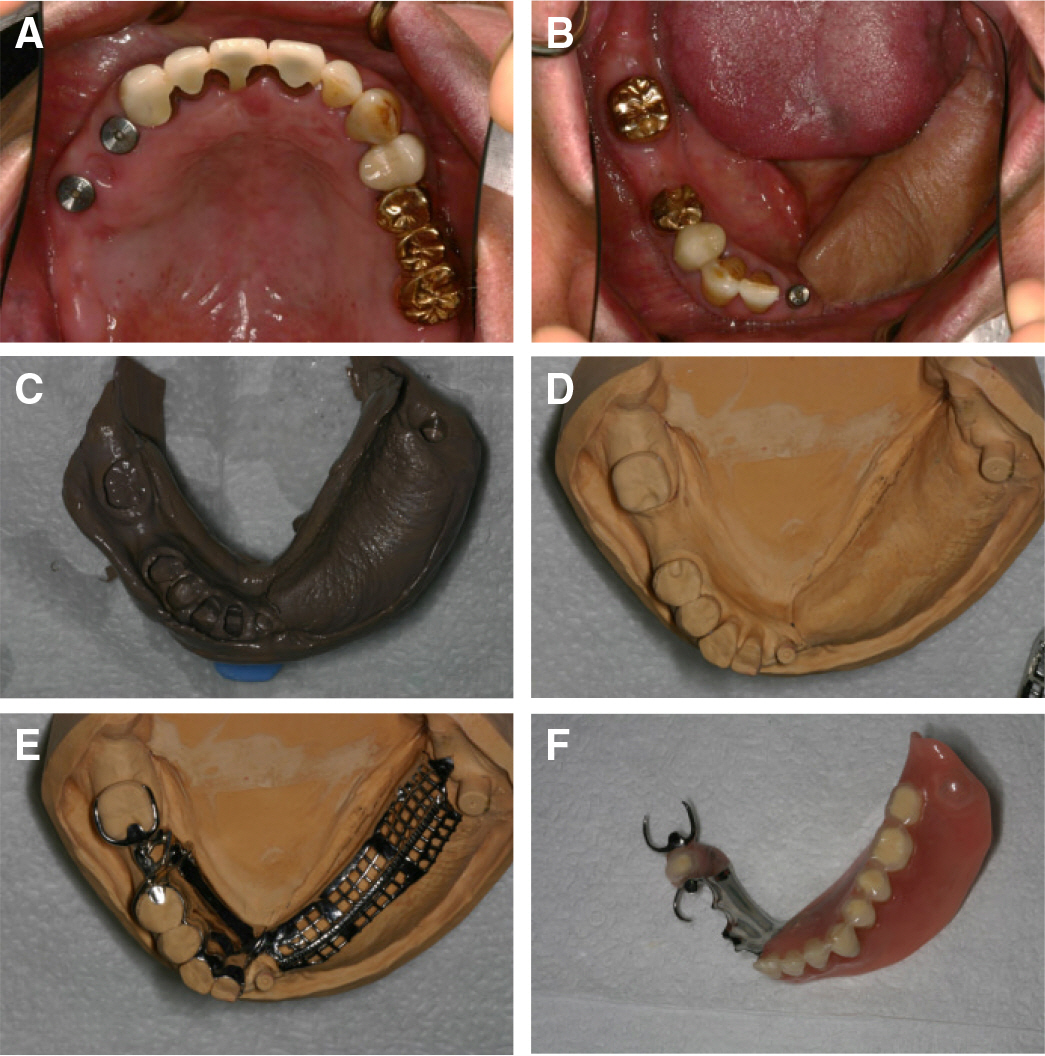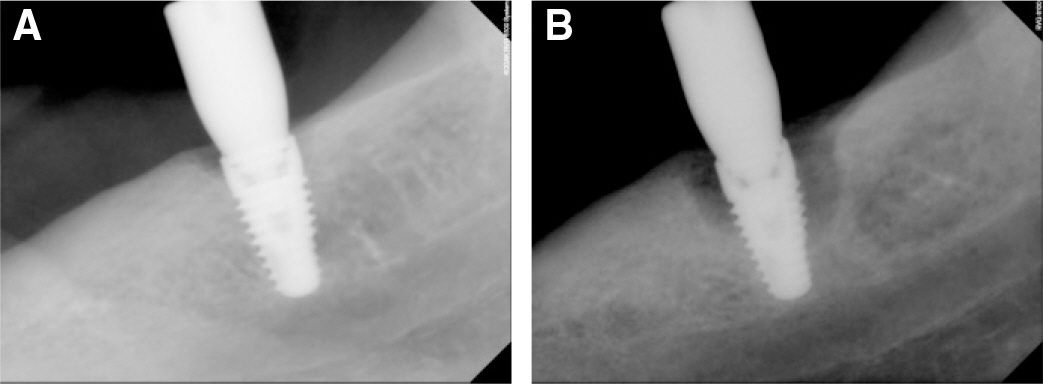J Korean Acad Prosthodont.
2016 Jul;54(3):280-285. 10.4047/jkap.2016.54.3.280.
Clinical application of implant assisted removable partial denture to patient who underwent mandibular resection with oral cancer: A case report
- Affiliations
-
- 1Department of Prosthodontics, College of Dentistry, Yonsei University, Seoul, Republic of Korea. JEE917@yuhs.ac
- 2Department of Oral and Maxillofacial Surgery, College of Dentistry, Yonsei University, Seoul, Republic of Korea.
- KMID: 2344868
- DOI: http://doi.org/10.4047/jkap.2016.54.3.280
Abstract
- Mandible defects could be caused by congenital malformations, trauma, osteomyelitis, tumor resection. If large areas are included for reconstruction, those are primarily due to tumor resection defects. The large jaw defect results in a problem about mastication, swallowing, occlusion and phonetics, and poor esthetics causes a lot of inconvenience in daily life. It is almost impossible to be a part underwent mandibular resection completely reproduced, should be rebuilt artificially. This case is of a patient who was diagnosed with squamous cell carcinoma pT1N0M0, stage I in February 2004 and received surgery (combined mandibulectomy and neck dissection operation (COMMANDO) in oromaxillofacial surgery) in March 2004, by implant assisted removable partial denture. We could obtain good retention and stability through sufficient coverage and implant holding. Follow up period was about four years. Mandibular left third molar regions have been observed to have resorption of surrounding bone, and periodic check-ups are necessary conditions.
MeSH Terms
Figure
Reference
-
1.Garrett N., Roumanas ED., Blackwell KE., Freymiller E., Abemayor E., Wong WK., Gerratt B., Berke G., Beumer J 3rd., Kapur KK. Efficacy of conventional and implant-supported mandibular resection prostheses: study overview and treatment outcomes. J Prosthet Dent. 2006. 96:13–24.
Article2.Teoh KH., Huryn JM., Patel S., Halpern J., Tunick S., Wong HB., Zlotolow IM. Implant prosthodontic rehabilitation of fibula free-flap reconstructed mandibles: a Memorial Sloan-Kettering Cancer Center review of prognostic factors and implant outcomes. Int J Oral Maxillofac Implants. 2005. 20:738–46.3.Hupp JR. Tucker MR, Ellis E. Contemporary oral and maxillofacial surgery. 5th ed.St. Louis: CV Mosby;2005. p. 605–16.4.Raoul G., Ruhin B., Briki S., Lauwers L., Haurou Patou G., Capet JP., Maes JM., Ferri J. Microsurgical reconstruction of the jaw with fibular grafts and implants. J Craniofac Surg. 2009. 20:2105–17.
Article5.Hotz G. Reconstruction of mandibular discontinuity defects with delayed nonvascularized free iliac crest bone grafts and endosseous implants: a clinical report. J Prosthet Dent. 1996. 76:350–5.
Article6.Disa JJ., Cordeiro PG. Mandible reconstruction with microvascular surgery. Semin Surg Oncol. 2000. 19:226–34.
Article7.Pogrel MA., Podlesh S., Anthony JP., Alexander J. A comparison of vascularized and nonvascularized bone grafts for reconstruction of mandibular continuity defects. J Oral Maxillofac Surg. 1997. 55:1200–6.
Article8.Leong EW., Cheng AC., Tee-Khin N., Wee AG. Management of acquired mandibular defects-prosthodontic considerations. Singapore Dent J. 2006. 28:22–33.9.Baker A., McMahon J., Parmar S. Immediate reconstruction of continuity defects of the mandible after tumor surgery. J Oral Maxillofac Surg. 2001. 59:1333–9.10.Adell R., Svensson B., Bågenholm T. Dental rehabilitation in 101 primarily reconstructed jaws after segmental resections-possibilities and problems. An 18-year study. J Craniomaxillofac Surg. 2008. 36:395–402.11.Salinas TJ., Desa VP., Katsnelson A., Miloro M. Clinical evaluation of implants in radiated fibula flaps. J Oral Maxillofac Surg. 2010. 68:524–9.
Article12.Cordeiro PG., Disa JJ., Hidalgo DA., Hu QY. Reconstruction of the mandible with osseous free flaps: a 10-year experience with 150 consecutive patients. Plast Reconstr Surg. 1999. 104:1314–20.
Article13.Holmgren EP., Seckinger RJ., Kilgren LM., Mante F. Evaluating parameters of osseointegrated dental implants using finite element analysis-a two-dimensional comparative study examining the effects of implant diameter, implant shape, and load direction. J Oral Implantol. 1998. 24:80–8.
Article
- Full Text Links
- Actions
-
Cited
- CITED
-
- Close
- Share
- Similar articles
-
- A case of oral rehabilitation in a patient with severe tooth wear and occlusal plane collapse, utilizing maxillary fixed prosthesis and mandibular implant-assisted removable partial denture
- Mandibular implant assisted removable partial denture with a small number of implant crowns: two case reports
- A case of treatment denture and implant-assisted removable partial denture in a patient with collapsed occlusion caused by partial loss of posterior and anterior teeth
- Rehabilitation of maxillary partial edentulous patients using implant assisted removable partial denture
- Rehabilitation of mandibular edentulous patients with a few unilateral remaining teeth using implant-assisted removable partial denture: A case report







